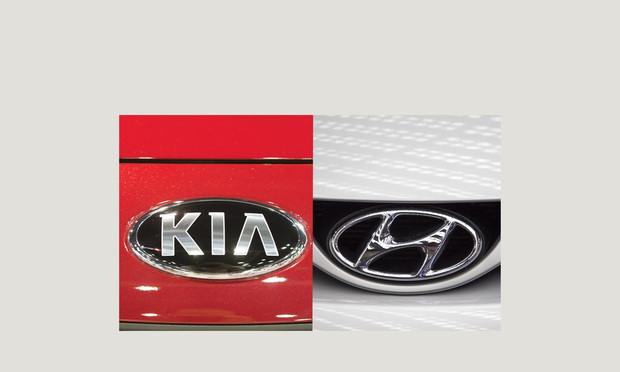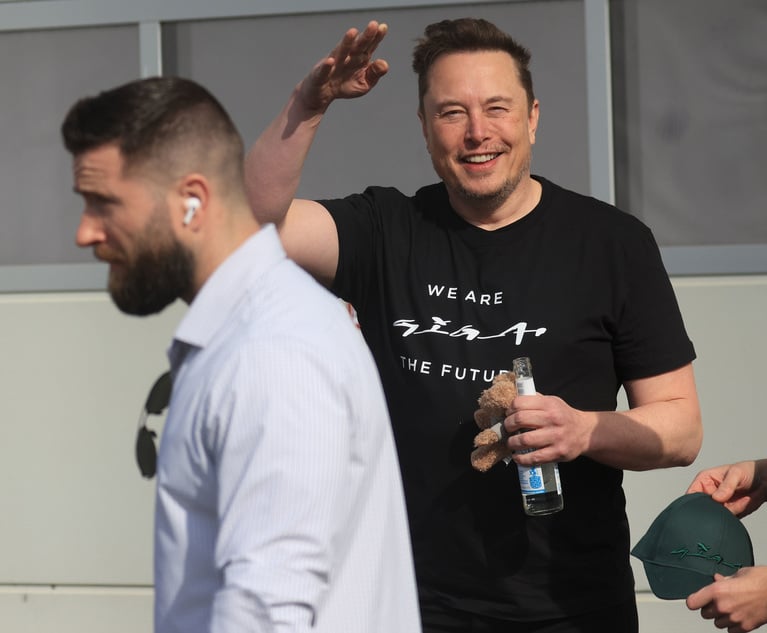Kia, Hyundai Face Deep Litigation Exposure Over Hundreds of Car Fires
As an investigation into car fires by Korean automakers Kia and Hyundai begins to take course, legal experts say that probe could determine these companies' exposure to civil litigation.
March 19, 2019 at 05:12 PM
4 minute read
 Kia and Hyundai logos. Photo: Shutterstock.com
Kia and Hyundai logos. Photo: Shutterstock.com
One day after Connecticut Attorney General William Tong announced his office would lead a multistate investigation into nationwide car fires involving Korean automakers Hyundai and Kia, legal experts said the result of that probe could determine those companies' litigation risks.
The two companies have recalled 500,000 vehicles over the fire risk, and Fortune.com reports there have been 300 engine fires since June.
Now, their risks seem to hinge on whether investigators could find the automobile manufacturers put profits over consumer safety. Meanwhile, it's not clear, to date, what other states could join Connecticut in its investigation of the car fires.
If the Tong-led investigation shows intentional malfeasance and neglect, the automakers could face a long road ahead, according to University of Connecticut School of Law professor Alexandra Lahav.
“The fact that they want to do an investigation does not mean it will yield evidence of wrongdoing, but if they find evidence that the cars have a propensity to spontaneously combust and this was known, then they have an obvious serious exposure legally for the car companies,” said Lahav, who specializes in mass torts and complex litigation. “It would mean a recall and probably many civil suits. You can just look at the many lawsuits against Volkswagen for the emission scandal, or GM arising out of the Kobalt car ignition-switch issue. If that is the case, you are looking at substantial exposure. But it all depends on what the investigation shows, and what the problem is.”
Similarly, Hartford-based attorney Jamie Sullivan said, “If the company had knowledge that these fires were a risk, and they made a business calculation that the costs of the fires would be less than the profits to be made from selling their defective vehicles, they'd be subject to punitive damages and a lot of lawsuits.”
But both Lahav and Sullivan said they believe the two carmakers could weather the fallout, even if they are found to have been in the wrong.
“They can survive,” said Sullivan, managing partner at Howard Kohn Sprague & FitzGerald. “There are some really loyal customers that really like and prefer Hyundais. People thought Volkswagen would go under, and they survived.”
Lahav agreed Hyundai and Kia could ride out the storm.
“One of the biggest costs to companies is reputational injury, in that people do not trust the car company,” she said. “If that's the case, they will buy a different brand. I don't think, though, that people will change their behavior until some kind of proof [of wrongdoing] comes out.”
In his release Monday, Tong said, “This is a serious matter, and we are moving aggressively and responsibly to uncover the facts and to ensure accountability.” The release noted there have been accounts of Hyundai and Kia vehicles spontaneously bursting into flames, and catching fire while driving or parked.
Both automobile manufacturers initiated recalls of several hundred thousand cars equipped with the Theta II Gasoline Direct Injection engine beginning in 2015. Fortune also reports that the carmakers are the subject of three separate recalls from the National Highway Traffic Safety Administration, or NHTSA.
Representatives of Hyundai and Kia said they are working to address the issues.
James Hope, national manager, product communication for Kia Motors America, said in a statement: “The safety of our customers is one of Kia's top priorities and we take this matter seriously. Kia is fully cooperating with state investigators into the performance of our vehicles and we have and will continue to openly share information and data with NHTSA and other investigative bodies in a full and transparent manner.”
Kia also said it voluntarily initiated several measures to ensure it addressed every noncollision vehicle fire. In June 2017, for instance, Kia recalled more than 600,000 Optimas, Sorentos and Sportage vehicles to address a manufacturing defect that could lead to engine failure and, in rare instances, fire.
Michael Stewart, senior group manager of corporate and marketing public relations for Hyundai, wrote, “Hyundai is fully cooperating with the government in this matter, and is committed to providing American motorists with safe, high quality, efficient and affordable vehicles.”
Related story:
Connecticut AG to Take Lead in Investigating Hyundai, Kia Car Fires
This content has been archived. It is available through our partners, LexisNexis® and Bloomberg Law.
To view this content, please continue to their sites.
Not a Lexis Subscriber?
Subscribe Now
Not a Bloomberg Law Subscriber?
Subscribe Now
NOT FOR REPRINT
© 2025 ALM Global, LLC, All Rights Reserved. Request academic re-use from www.copyright.com. All other uses, submit a request to [email protected]. For more information visit Asset & Logo Licensing.
You Might Like
View All
Recent FTC Cases Against Auto Dealers Suggest Regulators Are Keeping Foot on Accelerator
6 minute read
Attorney Overcomes Low Medical Bills, Captures $1 Million Policy Limit
2 minute read

Court Battle Over Musk's Compensation Is Far From Over, Even After Ratification Vote, Experts Say
3 minute readTrending Stories
Who Got The Work
J. Brugh Lower of Gibbons has entered an appearance for industrial equipment supplier Devco Corporation in a pending trademark infringement lawsuit. The suit, accusing the defendant of selling knock-off Graco products, was filed Dec. 18 in New Jersey District Court by Rivkin Radler on behalf of Graco Inc. and Graco Minnesota. The case, assigned to U.S. District Judge Zahid N. Quraishi, is 3:24-cv-11294, Graco Inc. et al v. Devco Corporation.
Who Got The Work
Rebecca Maller-Stein and Kent A. Yalowitz of Arnold & Porter Kaye Scholer have entered their appearances for Hanaco Venture Capital and its executives, Lior Prosor and David Frankel, in a pending securities lawsuit. The action, filed on Dec. 24 in New York Southern District Court by Zell, Aron & Co. on behalf of Goldeneye Advisors, accuses the defendants of negligently and fraudulently managing the plaintiff's $1 million investment. The case, assigned to U.S. District Judge Vernon S. Broderick, is 1:24-cv-09918, Goldeneye Advisors, LLC v. Hanaco Venture Capital, Ltd. et al.
Who Got The Work
Attorneys from A&O Shearman has stepped in as defense counsel for Toronto-Dominion Bank and other defendants in a pending securities class action. The suit, filed Dec. 11 in New York Southern District Court by Bleichmar Fonti & Auld, accuses the defendants of concealing the bank's 'pervasive' deficiencies in regards to its compliance with the Bank Secrecy Act and the quality of its anti-money laundering controls. The case, assigned to U.S. District Judge Arun Subramanian, is 1:24-cv-09445, Gonzalez v. The Toronto-Dominion Bank et al.
Who Got The Work
Crown Castle International, a Pennsylvania company providing shared communications infrastructure, has turned to Luke D. Wolf of Gordon Rees Scully Mansukhani to fend off a pending breach-of-contract lawsuit. The court action, filed Nov. 25 in Michigan Eastern District Court by Hooper Hathaway PC on behalf of The Town Residences LLC, accuses Crown Castle of failing to transfer approximately $30,000 in utility payments from T-Mobile in breach of a roof-top lease and assignment agreement. The case, assigned to U.S. District Judge Susan K. Declercq, is 2:24-cv-13131, The Town Residences LLC v. T-Mobile US, Inc. et al.
Who Got The Work
Wilfred P. Coronato and Daniel M. Schwartz of McCarter & English have stepped in as defense counsel to Electrolux Home Products Inc. in a pending product liability lawsuit. The court action, filed Nov. 26 in New York Eastern District Court by Poulos Lopiccolo PC and Nagel Rice LLP on behalf of David Stern, alleges that the defendant's refrigerators’ drawers and shelving repeatedly break and fall apart within months after purchase. The case, assigned to U.S. District Judge Joan M. Azrack, is 2:24-cv-08204, Stern v. Electrolux Home Products, Inc.
Featured Firms
Law Offices of Gary Martin Hays & Associates, P.C.
(470) 294-1674
Law Offices of Mark E. Salomone
(857) 444-6468
Smith & Hassler
(713) 739-1250










